20km men
- Ai 5km
In testa un gruppo di oltre 15 atleti, guidato da Perseus Karlstrom (SWE) in 20:11
- Ai 10km
Il passaggio a metà gara avviene in 40:33 (20:22 nei secondi 5km). Guida Toshikazu Yamanishi (JPN) seguito da Cesar Augusto Rodriguez, Perseus Karlstrom e Alvaro Martin. Sono in 15 i leaders.
- Ai 15km
I due atleti del Giappone (Yamanishi e Ikeda) hanno aperto i fuochi d'artificio e si sono partanti in testa seguiti da Samuel Kireri Gathimba (KEN). Passano in 59:57 (19:24 nei terzi 5km). Dietro gli inseguitori in 1:00:00 guidati da Alvaro martin e Perseus Karlstrom
- ultimi 5km e ultimo km in particolare
Alla campana passano Yamanishi e Ikeda (1:15:26), Gathimba (1:15:36), Karlstrom (1:15:37), Brian Daniel Pintado (1:15:42)
Toshikazu Yamanishi (JPN) compie gli ultimi 5km in 19:10 e va a vincere in 1:19:07
Secondo posto a Koki Ikeda (JPN) in 1:19:14
Terzo posto a Perseus Karlstrom (SWE) in 1:19:18
Quarto posto a Samuel Kireri Gathimba (KEN) in 1:19:25
Quinto posto a Brian Daniel Pintado (ECU) in 1:19:34
Sesto posto a Caio Bonfim (BRA) in 1:19:51
Settimo posto a Alvaro martin (ESP) in 1:20:19
Ottavo posto a Hiroto Jusho (JPN) in 1:20:39
La lista aggiornata delle prime 10 performances mondiali
Risultati Ufficiali - Official results
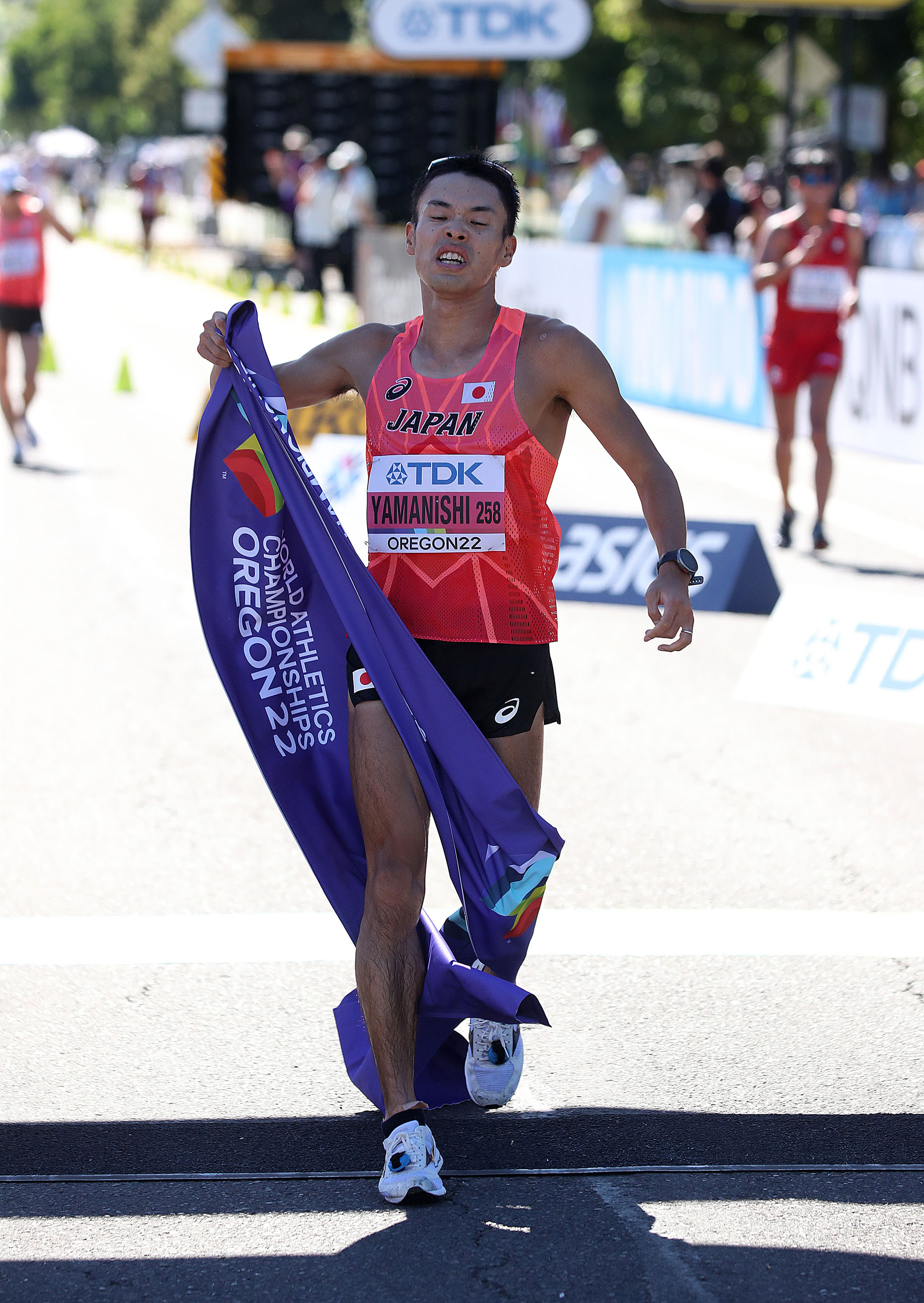
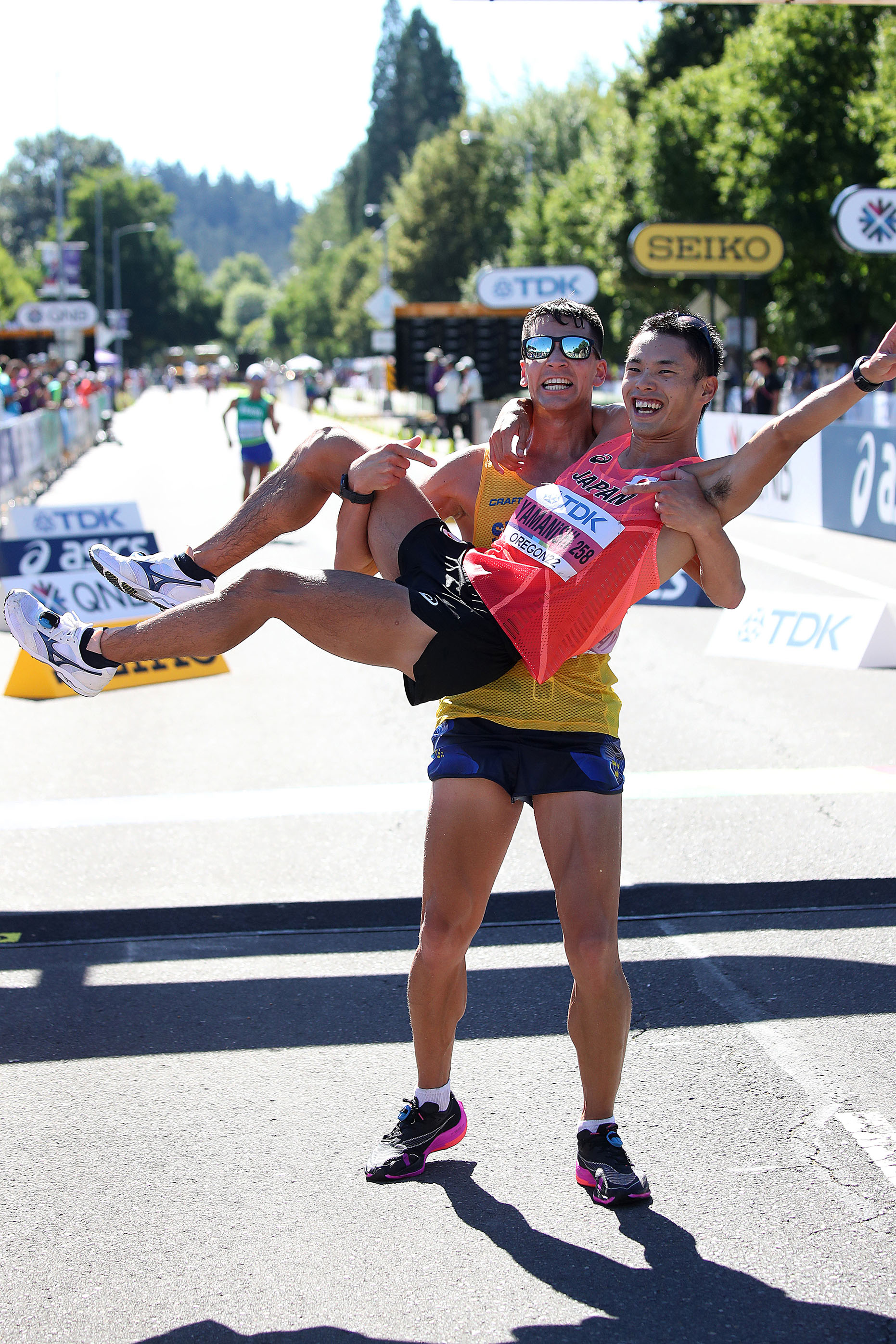
Dal sito web della World Athletics di Simon Turnbull
Toshikazu Yamanishi ha effettuato un giro entusiasmante nell'ultimo chilometro per superare il suo compagno di squadra giapponese Koki Ikeda e diventare solo il terzo uomo nella storia dei Campionati del Mondo a difendere con successo il titolo di 20 km di marcia.
Lo studente di fisica all'Università di Kyoto, Yamanishi ha attuato alla perfezione la sua tattica per vincere il primo evento maschile deciso ai Campionati mondiali di atletica leggera dell'Oregon22 in condizioni di caldo e umido.
Riducendo gradualmente il gruppo con una serie di ondate, il 26enne medaglia di bronzo olimpico è emerso vittorioso da quello che si è trasformato in un testa a testa con Ikeda stappando un devastante chilometro finale di 3:40 sull'ultimo dei 20 punitivi circuiti di Martin Luther King Jr Boulevard.
Tagliando il traguardo con sette secondi di vantaggio in 1:19:07, Yamanishi ha mantenuto il titolo conquistato a Doha tre anni fa, diventando il terzo vincitore multiplo del titolo mondiale della 20 km dopo l'italiano Maurizio Damilano (1987 e 1991) e l'ecuadoriano Jefferson Perez (2003 , 2005 e 2007).
Per Ikeda, secondo in 1:19:14, è stata la seconda medaglia d'argento mondiale in 12 mesi, essendo il 24enne arrivato secondo dietro all'italiano Massimo Stano nella 20km di marcia olimpica di Sapporo un anno fa.
Altrettanto drammatica fu la battaglia per il bronzo.
Terzo dietro a Yamanishi e Ikeda ai Campionati mondiali di marcia a squadre di atletica leggera a Muscat a marzo, il keniota Samuel Gathimba ha cercato un bronzo ancora più significativo guidando Perseus Karlstrom nel circuito finale. Il 34enne si è dovuto accontentare del quarto posto, tuttavia, poiché il grande svedese ha realizzato un 3:41 nell'ultimo giro.
Karlstrom ha eguagliato il bronzo ottenuto a Doha, segnando 1:19:18, con il valoroso Gathimba quarto in 1:19:25, un enorme balzo in avanti rispetto al precedente piazzamento più alto (26°) del Kenya nello stesso evento.
Il campione dei Giochi Panamericani dell'Ecuador Brian Pintado è stato quinto in 1:19:34 e Caio Bonfim, medaglia di bronzo mondiale del Brasile 2017, sesto in 1:19.51.
Un notevole assente dal campo di 45 forti è stato il campione olimpico Stano, l'italiano che ha deciso di concentrarsi sulla 35 km della domenica settimana (24).
L'irlandese David Kenny ha colpito fugacemente il davanti alla partenza, ma Yaminishi ha presto espresso le sue intenzioni, aprendo un vantaggio di quattro secondi mentre ha completato il primo giro di 1 km in 3:55.
Il 26enne ha proseguito con divisioni di 4:00 e 4:03, ma è rientrato nel gruppo dopo 3,5 km, con la figura alta e potente di Karlstrom che ha preso il comando, seguito da vicino dal campione europeo di Spagna Alvaro Martin e dal Perù Cesar Augusto Rodriguez, medaglia di bronzo ai Campionati sudamericani.
Solo due secondi hanno separato i primi 23 uomini quando Karlstrom ha superato i 5 km in 20:11, le frazioni di 1 km sono rallentate a 4:06 e 4:07. Subito dopo, Yamanishi è ricomparso in testa, alternandosi per spingere il ritmo con l'ecuadoriano Pintado.
A questo punto, quando sono passati 7 km in 28:23, alcuni dei grandi battitori hanno iniziato a rimanere indietro. Eider Arevalo, il campione del mondo 2017 dalla Colombia, si è staccato dal gruppo, insieme al quinto classificato olimpico tedesco Christopher Linke.
Yamanishi era in testa a metà corsa, con il cronometro a 40:33, ma il campione in carica ha ridotto il gruppo da 18 a 10 con l'iniezione di un giro di 3:51, il più veloce della gara.
Ancora una volta, ha scelto di tornare indietro, ma non per molto. Yamanishi ha iniettato la sua terza ondata al giro 13, scuotendo altri due rivali dal gruppo.
Per la prima volta Gathimba è apparso vicino al fronte, seguendo Yamanishi e Karlstrom al terzo posto. Dopo che Yaminishi ha aperto un altro divario con uno split di 3:52 tra 13 km e 14 km, il keniota in fase di sviluppo ha iniziato l'inseguimento insieme alla medaglia d'argento olimpica Ikeda.
Yaminishi ha condotto il trio di 15 km in 59:57, grazie ai 5 km più veloci della gara: 19.24, ma proprio mentre sembrava che si stesse formando un trio di potenziali vincitori di medaglia, Karlstrom sembrava fuori dai giochi, quarto, apparentemente distaccato fino in fondo.
Poco prima del km 17, Yaminishi ha messo nuovamente il piede sull'acceleratore. Questa volta è riuscito a far cadere Karlstrom in modo decisivo. Anche Gathimba iniziò a svanire, lasciando la corsa per l'oro a una battaglia tra Yaminishi e Ikeda.
A due giri dalla fine, dopo che la coppia ha superato il 18° chilometro in 3:50, Ikeda ha colpito per la prima volta la parte anteriore. Il suo compagno di squadra, però, non si è indebolito.
All'inizio dell'ultimo giro, dopo un circuito di 3:51, Yaminishi ha fatto la sua mossa decisiva, prendendo a pugni l'aria mentre si avvicinava al traguardo. Il suo giro finale di 3:40 è stato solo un secondo più veloce del potente sforzo che ha portato Karlstrom al bronzo davanti al Gathimba in battaglia.
Simon Turnbull per World Athletics
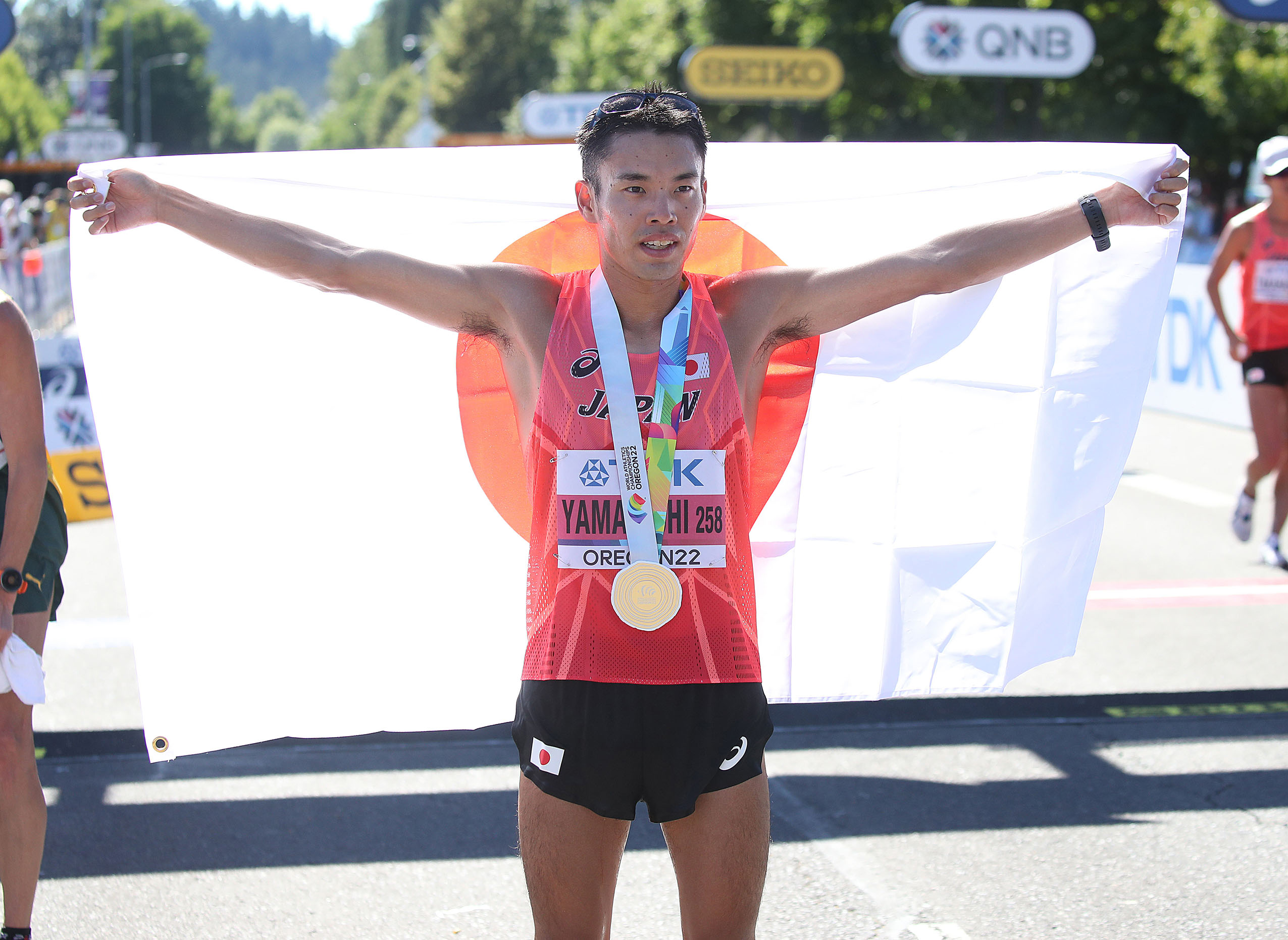
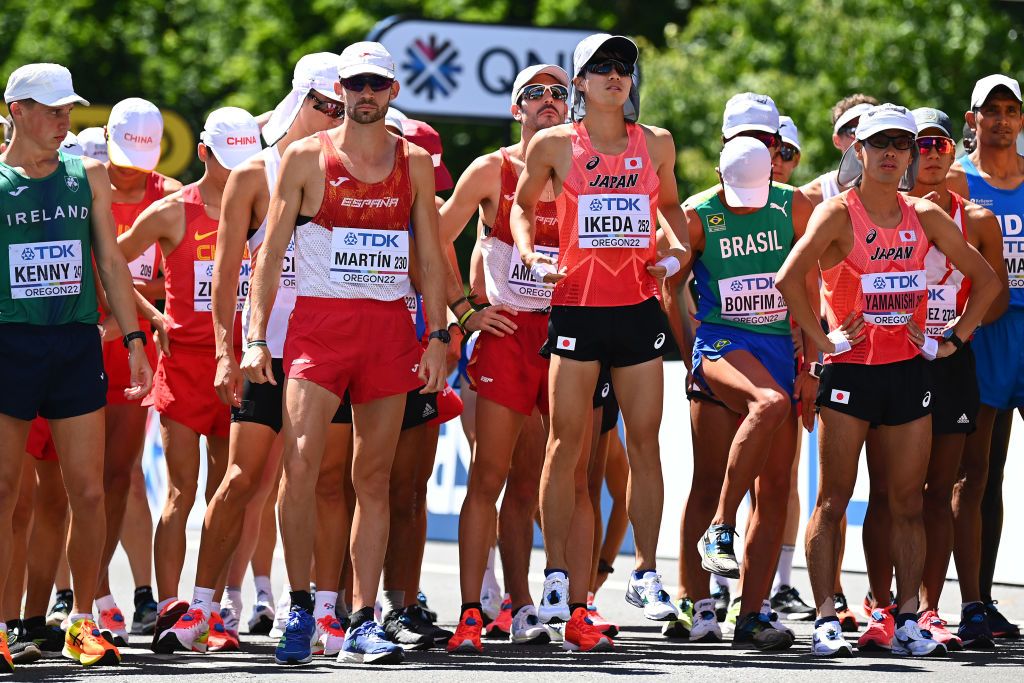
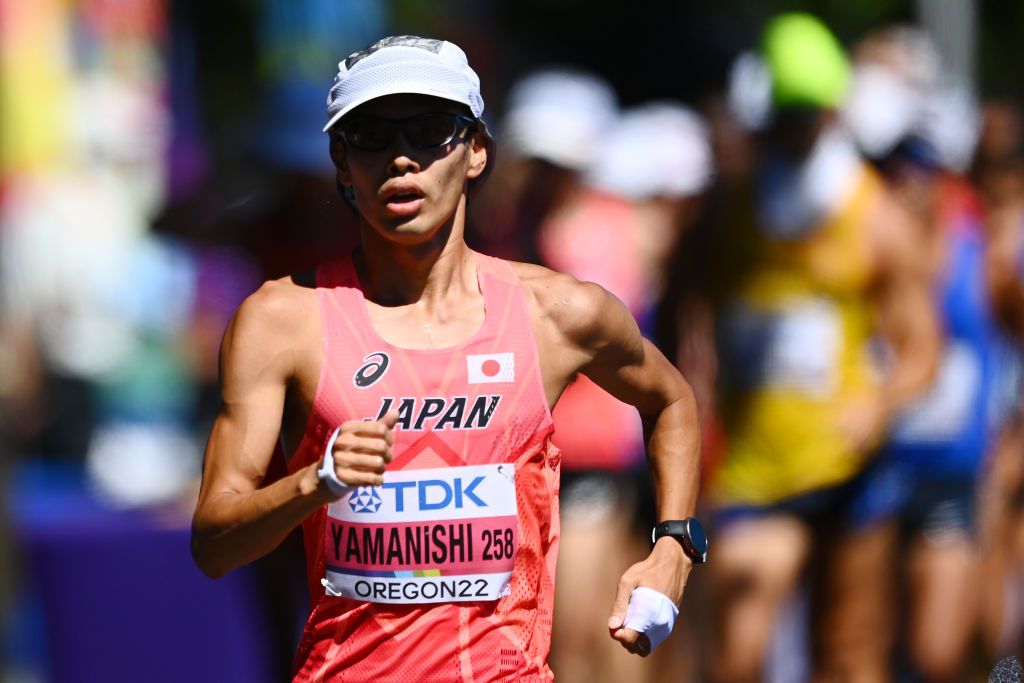
35km men
Se c’è una gara di marcia nei Campionati Mondiali di Oregon 2022, questa, almeno per noi, è la 35km uomini.
La seconda (ma la prima in un campionato mondiale) esperienza degli atleti sulla distanza, le possibilità di abbinare alla 20km della settimana precedente e la poca storia di gare nella stagione saranno le principali variabili che influenzeranno questa prova.
Già la gara delle donne ha decretato con le sue tre medaglie assegnate in maniera identica a quelle della 20km che la 35km sembra privilegiale i marciatori “veloci” a quelli “di resistenza”.
E qui nella lista dei partenti di marciatori “di resistenza” non ce ne sono proprio tanti.
Masatora Kawano (JAP) con il suo 3:36:45 che è il record nazionale del Giappone e che è anche il world leader 2022 della 35km in 2:26:40
Tomohiro Noda (JPN) con i suoi 50: 3:39:47 e 35: 2:27:18
Il campione olimpico Dawid Tomala (POL) con i suoi 50: 3:49:23 e 35: 2:37:22
Il bonzo olimpico Evan Dunfee (CAN) con i suoi 3:41:38 e 35: 2:38:08
Karl Junghannss (GER) con i suoi 50: 3:47:01 e 35: 2:31:37
Carl Dohmann (GER) con i suoi 50: 3:35:21 e 35: 2:30:59
Il decano Joao Vieira (POR) con i suoi 50: 3:45:15 e 35: 2:33:23
Tutti gli altri hanno prevalentemente avuto delle esperienze di “marcia veloce”.
Dovrebbero essere in 50 alla partenza in rappresentanza di 28 Paesi.
Se anche la gara degli uomini dovesse dare lo stesso riscontro di quella delle donne e dirci che la 35km è a privilegio dei marciatori “veloci” crediamo veramente che si apriranno delle discussioni sui cui risvolti al momento non vogliamo nemmeno pensare.
E veniamo alla gara.
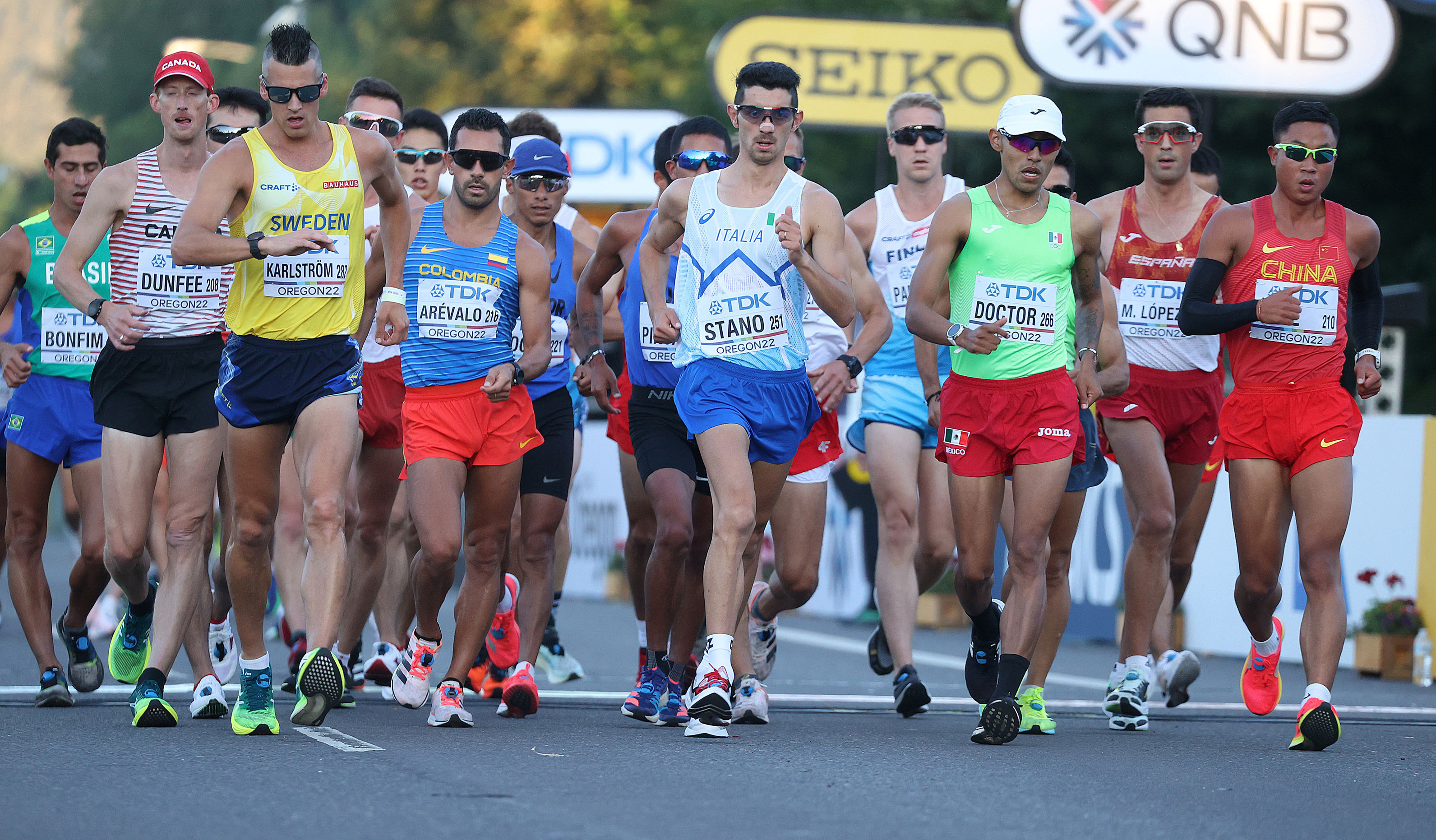
- ai 5km
La follia giapponese (ma sarà follia ?), con Daisuke Matasunaga, si manifesta subito dopo il colpo di pistola e ci ricorda Doha 2019, quando Yusuke Suzuki non fu più ripreso nella 50km.
Il suo tempo ai 5km è di 20:15 con un vantaggio di 48 secondi su un gruppo di una quindicina di atleti tra i quali si nota Perseus Karlstrom con un nuovo look tipo “l’ultimo dei Moicani”, He Xianghong (CHN), Jose Luis Doctor (MEX), Eider Arevalo (COL), Miguel Angel Lopez (ESP), Dawid Tomala (POL) e Massimo Stano (ITA).
Tutti quanti passano in 21:02.
La partita a scacchi è appena cominciata e la gara si può anche prospettare sulle 2:25:00.
- ai 10km
Matsunaga passa in 40:38 (secondi 5km in 20:23).
Il gruppo dietro si è sfoltito ed ora sono in nove (Brian Daniel Pintado, He Xianghong, José Luis Doctor, Perseus Karlstrom, Massimo Stano, Ricardo Ortiz, Masatora Kawano, Miguel Angel Lopez e Eider Arevalo) a 53 secondi in 41:31.
Segue Tomohiro Noda in 41:41
- ai 15km
Rallenta l’andatura di Matsunaga che copre i terzi 5km in 20:52 per un totale di 1:10:10
Dietro a lui gli otto inseguitori già indicato ai 10km. Il loro passaggio è di 1:02:02 ed il loro distacco è di 52 secondi
- ai 20km
Si mette male per Matsunaga. La sua andatura rallenta di molto mentre gli inseguitori da dietro aumentano il passo.
Passa in 1:22:33 (quarti 5km in 21:23) ma il suo vantaggio è ridotto a soli 7 secondi. Verrà ripreso poco dopo.
Gli otto inseguitori sono passati in 1:22.40.
Ora comincia la lotta per le medaglie.

- ai 25km
La situazione è cambiata.
Guidano il gruppo Brian Daniel Pintado, Masatora Kawano, He Xianghong, Perseus Karlstrom in 1:43:04 (quinti 5km in 20:31)
He Xianghong, Jose Luis Doctor, Massimo Stano, in 1:43:06
Stanno rientrando Tomohiro Noda (1:14:28) e Evan Dunfee (1:43:29), mentre Miguel Angel Lopez e Eider Arevala perdono terreno.
Matsunada è fuori dai giochi.
- ai 30km
Fra i leader José Luis Doctor (MEX) viene fermato nella zona di penalità.
Restano in cinque a guidare (Stano, He, Kawano, Pintado e Karlstrom).
Il loro passaggio è di 2:03:24 (sesti 5 km in 21:20),
Cede il cinese e per la lotta delle medaglie restano in quattro
- ultimi 5km
La lotta tra i quattro perde Pintado,
Stano forza il passo e cede Karlstrom che poi rientra su Kawano e lo stesso Stano.
Ma Stano ancora impone il suo ritmo e resiste solo Masatora Kawano.
Karlstrom cerca di limitare i danni e mantenere il bronzo
Nell’ultimo km Stano sembra un rullo compressore, ma con una velocità incredibile (19:50 negli ultimi 5km) stacca Kawano che tenta e ritenta in tutti i modi di riagganciarlo.
Sul rettilineo d’arrivo Stano si volta, lo vede a sei metri di distanza e decide di andare a prendere la bandiera dell’Italia perdendo un paio di secondi.
Ma vince con la bandiera.
Veramente si riscrive la storia della marcia. Il tempo di Stano negli ultimi 5km dice che non ci sarà spazio nel futuro per i marciatori di “endurance” sui 35km.
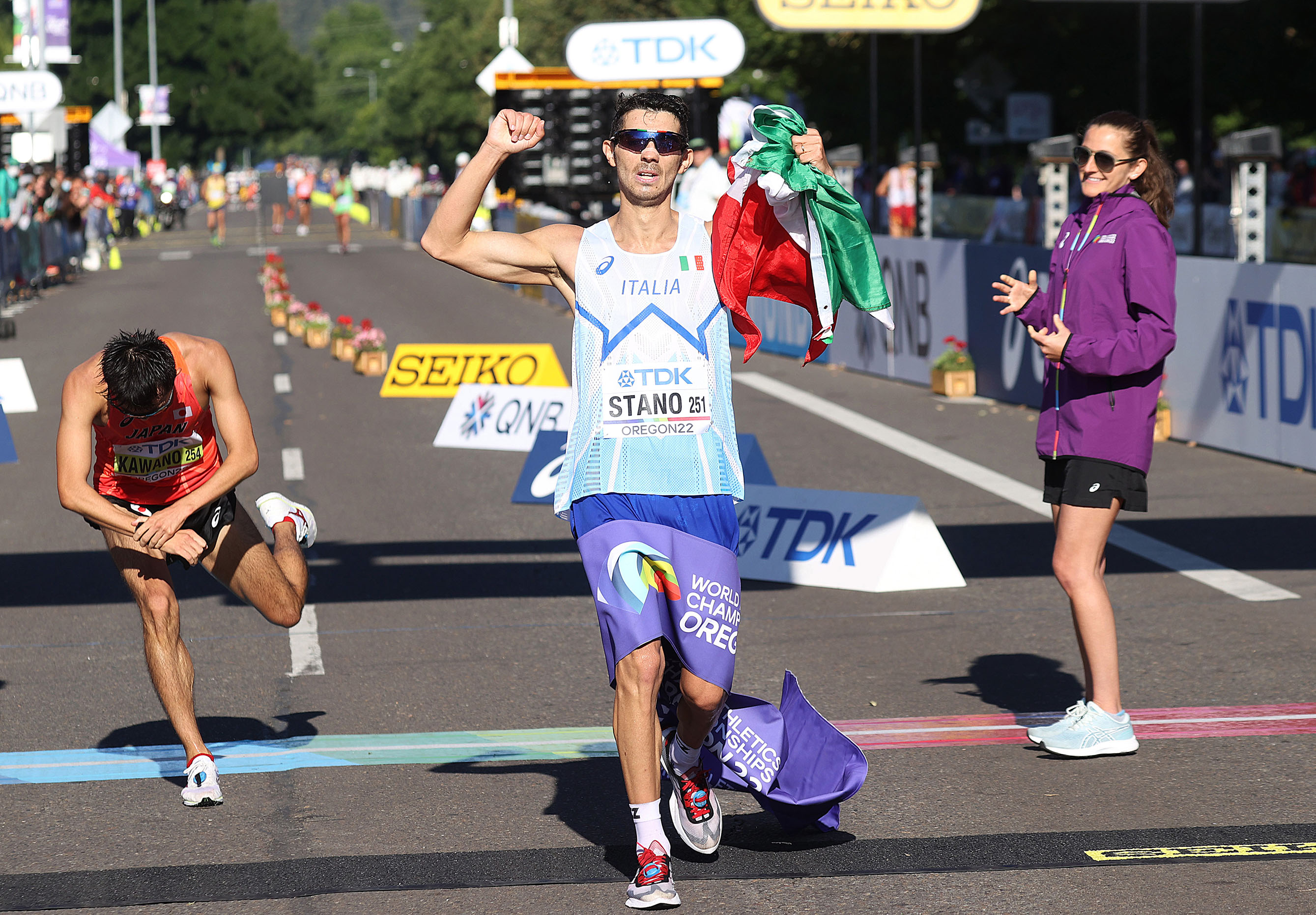
Ordine d'arrivo
1.- 2:23:14 Massimo STANO (ITA)
2.- 2:23:15 Masatora KAWANO (JPN)
3.- 2:23:44 Perseus KARLSTRÖM (SWE)
4.- 2:24:37 Brian Daniel PINTADO (ECU)
5.- 2:24:45 Xianghong HE (CHN)
6.- 2:25:02 Evan DUNFEE (CAN)
7.- 2:25:14 Caio BONFIM (BRA)
8.- 2:25:21 Eider ARÉVALO (COL)
9.- 2:25:29 Tomohiro NODA (JPN)
10.- 2:25:58 Miguel Ángel LÓPEZ (ESP)
Ci togliamo un sassolino dalle scarpe
Questa volta Marcia dal Mondo desidera togliersi un sassolino dalle scarpe.
Lo scorso anno in occasione della vittoria di Massimo Stano in quel di Sapporo, un noto direttore di un altrettanto noto quotidiano sportivo italiano usci con un fondo non certamente molto entusiasta dopo la vittoria olimpica.
La colpa del nostro atleta sarebbe stata quella di non aver voluto rispondere ad ipotetiche posibilità di vittoria di un altrettanto noto atleta.
Probabilmente quel direttore sulla marcia deve ancora imparare che le medaglie, qualsiasi colore esse abbiano, ma in particolare quelle d'oro, vanno prima vinte e poi ci si può permettere di dire qualcosa.
Mai nella lunga storia della marcia italiana è accaduto che un vincitore olimpico vincesse l'anno seguente la sua vittoria (o due anni dopo) un titolo mondiale.
A livello mondiale di riuscì una volta soltanto il grande Robert Korzeniowski.
Chissà se questo sarà sufficiente per un articolo di fondo, questa volta, meno di parte.
La graduatoria mondiale aggiornata della 35km men
|
|
|
Mark |
Competitor |
Nat |
Venue |
Date |
|
1 |
2:23:14 |
Massimo STANO |
 ITA ITA |
Eugene, OR (USA) |
24 JUL 2022 |
|
2 |
2:23:15 |
Masatora KAWANO |
 JPN JPN |
Eugene, OR (USA) |
24 JUL 2022 |
|
3 |
2:23:44 |
Perseus KARLSTRÖM |
 SWE SWE |
Eugene, OR (USA) |
24 JUL 2022 |
|
4 |
2:24:37 |
Brian Daniel PINTADO |
 ECU ECU |
Eugene, OR (USA) |
24 JUL 2022 |
|
5 |
2:24:45 |
Xianghong HE |
 CHN CHN |
Eugene, OR (USA) |
24 JUL 2022 |
|
6 |
2:25:02 |
Evan DUNFEE |
 CAN CAN |
Eugene, OR (USA) |
24 JUL 2022 |
|
7 |
2:25:14 |
Caio BONFIM |
 BRA BRA |
Eugene, OR (USA) |
24 JUL 2022 |
|
8 |
2:25:21 |
Eider ARÉVALO |
 COL COL |
Eugene, OR (USA) |
24 JUL 2022 |
|
9 |
2:25:29 |
Tomohiro NODA |
 JPN JPN |
Eugene, OR (USA) |
24 JUL 2022 |
|
10 |
2:25:58 |
Miguel Ángel LÓPEZ |
 ESP ESP |
Eugene, OR (USA) |
24 JUL 2022 |
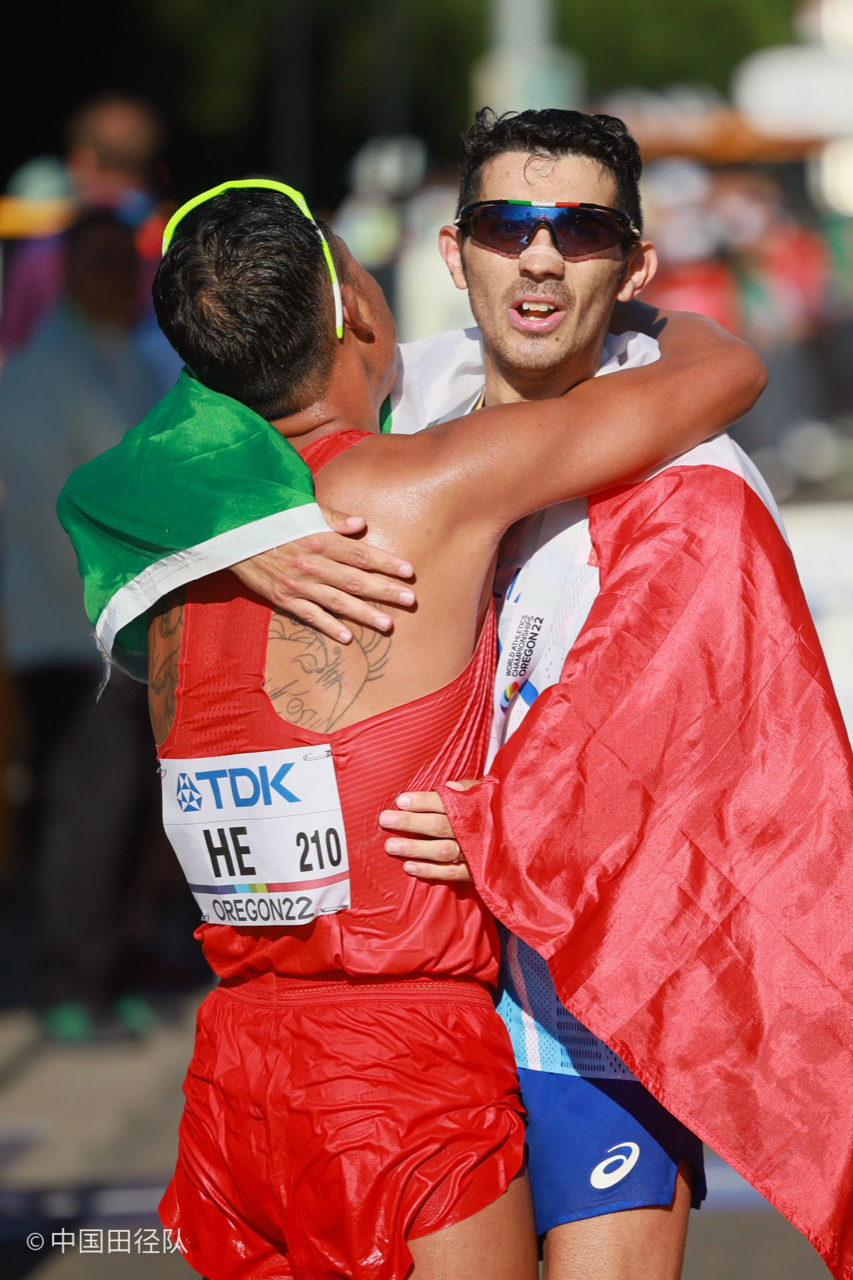
(dal sito web della World Athletics by Mike Rowbottom)
Il campione olimpico italiano di 20km di marcia Massimo Stano ha vinto la gara di 35km maschile che si è tenuta per la prima volta ai Campionati Mondiali di atletica leggera, segnando 2:23:14 per tenere a bada il giapponese Masatora Kawano in Oregon domenica (24). Kawano è crollato oltre il traguardo un secondo dopo per l'argento in un record asiatico di 2:23:15.
L'italiano è stato il primo ad aiutare il rivale battuto a rialzarsi.
Lo svedese Perseus Karlstrom, che aveva vinto il bronzo nella 20km di marcia maschile della giornata di apertura dietro la coppia giapponese di Toshikazu Yamanishi e Koki Ikeda, ha ottenuto il bronzo con un record personale di 2:23:44.
Il connazionale di Kawano, Daisuke Matsunaga aveva scommesso molto nella prima metà della gara, stabilendo un vantaggio di oltre un minuto al 13° chilometro, ma al 21° chilometro è stato superato dal gruppo e alla fine è arrivato 26°, a più di 10 minuti dal ritmo .
Ma è stato uno sforzo coraggioso da parte dell'uomo che era partito secondo nella top list del 2022, essendo arrivato secondo dietro a Kawano alle prove giapponesi di aprile in 2:27:09.
Brian Pintado dell'Ecuador, quarto, ha avuto la consolazione di stabilire un record sudamericano di 2:24:37, mentre il cinese He Xianghong ha stabilito un record asiatico di 2:24:45 al quinto posto e Evan Dunfee del Canada, che ha preso il bronzo nell'ultima marcia olimpica maschile di 50 km a Sapporo la scorsa estate, è stato sesto con un record nordamericano di 2:25:02.
Karlstrom, che ha festeggiato con un gigantesco cappello da vichingo blu e giallo in testa, era stato l'uomo che aveva fatto di più per raggiungere la figura solitaria di Matsunaga, il cui coraggioso sforzo sembrava per alcuni chilometri come se potesse persino funzionare.
L'atleta giapponese di 27 anni, che è arrivato settimo nella 20km di marcia maschile di Rio 2016 dopo aver vinto il titolo asiatico all'inizio dell'anno, era un uomo in fuga fin dall'inizio, lanciandosi lungo il percorso ad anello di 1 km su Martin Luther King Jr Boulevard nel centro di Eugene per creare un vantaggio significativo di quasi mezzo minuto dopo il primo chilometro, che ha coperto in 3:59, con il gruppo più di 25 secondi dietro.
Quel vantaggio è cresciuto costantemente mentre il gruppo è rimasto stretto, ma poco dopo i 20km l'equilibrio della gara ha ribaltato e il gruppo inseguitore è diventato il gruppo di testa.
A poco a poco il gruppo di otto si è ridotto, al punto che a 5 km dalla fine erano rimasti cinque contendenti: Stano, Kawano, Karlstrom, Pintado e He.
Doveva partire per primo, poi Pintado. E mentre i primi tre si muovevano attraverso i 33 km, il campo si stava riformando in una coppia, con lo svedese alla deriva.
Stano, impassibile, inesorabile, era un oggetto immobile. Kawano, nel disperato tentativo di emulare la precedente vittoria di Yamanishi, ha mostrato il dolore alla sua faccia ed è stato una forza completamente esaurita mentre ha tagliato il traguardo dopo aver gestito una disperata ondata finale negli ultimi 10 metri.
A differenza di Karlstrom, Stano aveva deciso di concentrare le sue energie sulla gara più lunga, che ora è la compagna ufficiale della 20km maschile e femminile dei campionati maggiori.
Mike Rowbottom per World Athletics
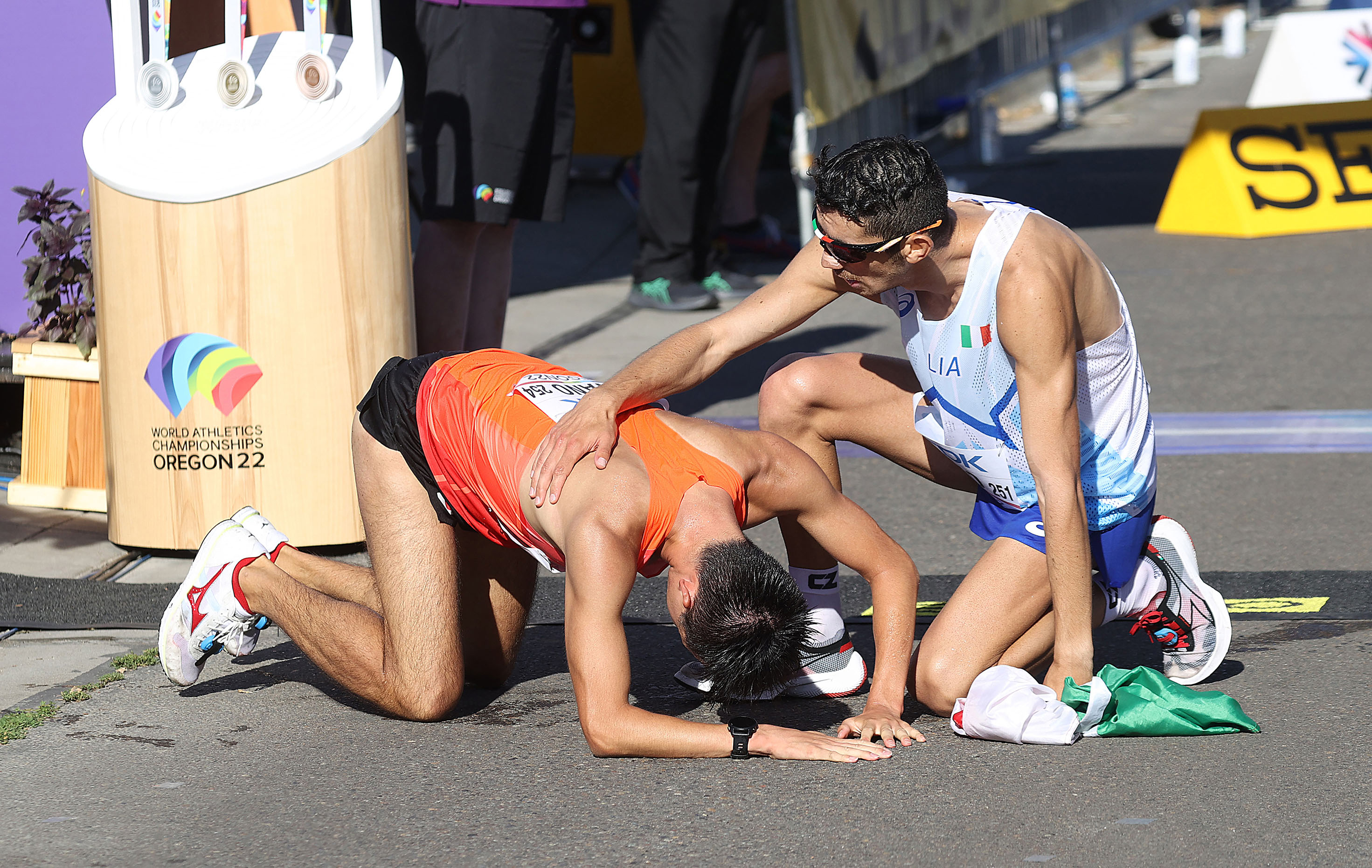
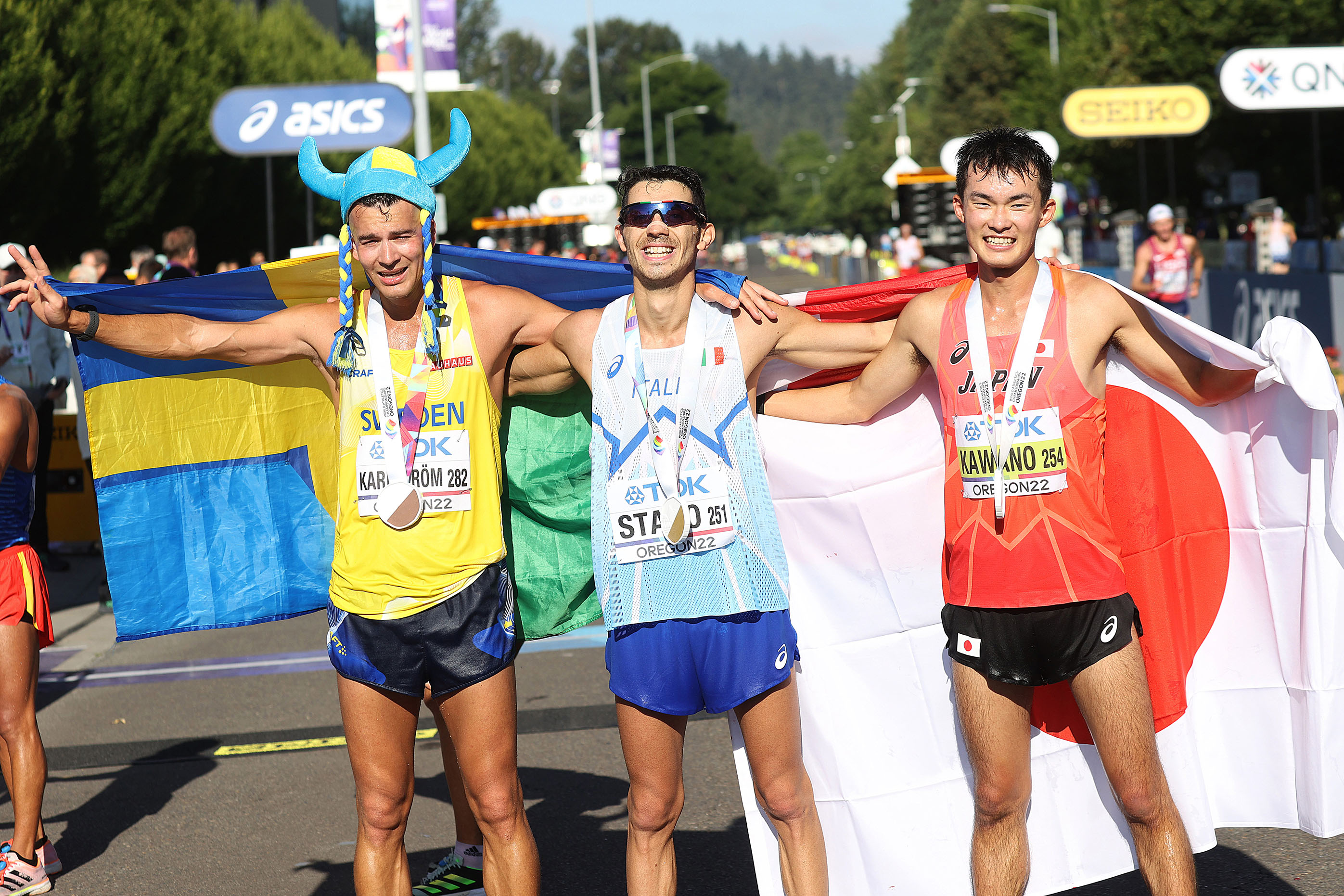

(English version)
20km men
- At 5km
Leading a group of over 15 athletes, led by Perseus Karlstrom (SWE) in 20:11
- At 10km
The passage in the middle of the race takes place in 40:33 (20:22 in the second 5km). Guide Toshikazu Yamanishi (JPN) followed by Cesar Augusto Rodriguez, Perseus Karlstrom and Alvaro Martin. There are 15 leaders.
- At 15km
The two athletes from Japan (Yamanishi and Ikeda) opened the fireworks and started in the lead followed by Samuel Kireri Gathimba (KEN). They pass in 59:57 (19:24 in the third 5km). Behind the pursuers in 1:00:00 led by Alvaro martin and Perseus Karlstrom
- last 5km and last km in particular
At the bell pass Yamanishi and Ikeda (1:15:26), Gathimba (1:15:36), Karlstrom (1:15:37), Brian Daniel Pintado (1:15:42)
Toshikazu Yamanishi (JPN) completes the last 5km in 19:10 and wins in 1:19:07
Second place to Koki Ikeda (JPN) in 1:19:14
Third place to Perseus Karlstrom (SWE) in 1:19:18
Fourth place to Samuel Kireri Gathimba (KEN) in 1:19:25
Fifth place went to Brian Daniel Pintado (ECU) in 1:19:34
Sixth place in Caio Bonfim (BRA) in 1:19:51
Seventh place to Alvaro martin (ESP) in 1:20:19
Eighth place to Hiroto Jusho (JPN) in 1:20:39
The updated list of the top 10 world performances
Risultati Ufficiali - Official results
(From World Athletics web site by Simon Turnbull)
Toshikazu Yamanishi produced a storming final kilometre lap to overcome his Japanese teammate Koki Ikeda and become only the third man in World Championships history to successfully defend the 20km race walk title.
A student of physics at Kyoto University, Yamanishi judged his tactics to perfection to win the first men’s event to be decided at the World Athletics Championships Oregon22 in hot and humid conditions.
Whittling down the pack by degrees with a series of surges, the 26-year-old Olympic bronze medallist emerged victorious from what turned into a head-to-head with Ikeda by uncorking a devastating 3:40 final kilometre on the last of 20 punishing circuits of Martin Luther King Jnr Boulevard.
Crossing the line seven seconds clear in 1:19:07, Yamanishi retained the title he claimed in Doha three years ago, becoming the third multiple winner of the 20km world title after Italy’s Maurizio Damilano (1987 and 1991) and Ecuador’s Jefferson Perez (2003, 2005 and 2007).
For Ikeda, the runner-up in 1:19:14, it was a second global silver medal in 12 months, the 24-year-old having finished second to Italy’s Massimo Stano in the Olympic 20km race walk in Sapporo a year ago.
The battle for bronze was equally dramatic.
Third behind Yamanishi and Ikeda at the World Athletics Race Walking Team Championships in Muscat in March, Kenya’s Samuel Gathimba looked on course for an even more meaningful bronze as he led Perseus Karlstrom into the final circuit. The 34-year-old had to settle for fourth place, however, as the big Swede produced a 3:41 last lap.
Karlstrom matched the bronze he achieved in Doha, clocking 1:19:18, with the gallant Gathimba fourth in 1:19:25 – a huge advance of Kenya’s previous highest placing in the event, 26th.
Ecuador’s Pan American Games champion Brian Pintado was fifth in 1:19:34 and Brazil’s 2017 world bronze medallist Caio Bonfim sixth in 1:19.51.
One notable absentee from the 45-strong field was Olympic champion Stano, the Italian having decided to concentrate on the 35km event on Sunday week (24).
Ireland’s David Kenny fleetingly hit the front at the start but Yaminishi soon set out his intentions, opening up a lead of four seconds as he completed the first 1km lap in 3:55.
The 26-year-old followed up with splits of 4:00 and 4:03 but dropped back into the pack after 3.5km, with the tall, powerful figure of Karlstrom assuming the lead, closely followed by Spain’s European champion Alvaro Martin and Peru’s South American Championships bronze medallist Cesar Augusto Rodriguez.
Just two seconds separated the first 23 men as Karlstrom passed 5km in 20:11, the 1km splits having slowed to 4:06 and 4:07. Soon after, Yamanishi reappeared at the front, taking turns to push the pace with the Ecuadorian Pintado.
By this time, as 7km passed in 28:23, some of the big hitters started to drop behind. Eider Aravalo, the 2017 world champion from Colombia, peeled off the back of the pack, together with Germany’s Olympic fifth-placer Christopher Linke.
Yamanishi was at the front at half way, with the clock at 40:33, but the defending champion whittled down the pack from 18 to 10 with the injection of a 3:51 lap, the fastest of the race.
Once again, he chose to drop back, but not for very long. Yamanishi injected his third surge on lap 13, shaking another two rivals out of the pack.
For the first time Gathimba appeared near the front, tracking Yamanishi and Karlstrom in third. After Yaminishi opened up another gap with a 3:52 split between 13km and 14km, the late-developing Kenyan took up the pursuit together with Olympic silver medallist Ikeda.
Yaminishi led the trio through 15km in 59:57, courtesy of the fastest 5km split of the race: 19.24, but just as a trio of potential medallists appeared to be forming, Karlstrom shot from a seemingly detaching fourth to the very front.
Just before the 17km mark, Yaminishi put his foot on the gas once again. This time he succeeded in dropping Karlstrom decisively. Gathimba also started to fade, leaving the race for gold down to a battle between Yaminishi and Ikeda.
With two laps to go, after the pair breezed through the 18th kilometre in 3:50, Ikeda hit the front for the first time. His teammate, however, didn’t weaken.
At the start of the final lap, after a 3:51 circuit, Yaminishi made his decisive move, punching the air as he approached the line. His 3:40 final loop was only one second faster than the mighty effort that took Karlstrom to bronze ahead of the battling Gathimba.
Simon Turnbull for World Athletics
35km men
If there is a walking race in the Oregon 2022 World Championships, this, at least for us, is the men's 35km.
The second (but first in a World Championship) experience of the athletes on distance, the possibilities of matching the 20km of the previous week and the little history of racing in the season will be the main variables that will influence this event.
Already the women's race has decreed with its three medals assigned in an identical manner to those of the 20km that the 35km seems to favor "fast" walkers over "endurance" ones.
And here in the list of starters of "endurance" walkers there are not so many.
Masatora Kawano (JAP) with his 3:36:45 which is the national record of Japan and who is also the 2022 world leader of the 35km in 2:26:40
Tomohiro Noda (JPN) with his 50: 3:39:47 and 35: 2:27:18
Olympic champion Dawid Tomala (POL) with his 50: 3:49:23 and 35: 2:37:22
Olympic bonze Evan Dunfee (CAN) with his 3:41:38 and 35: 2:38:08
Karl Junghannss (GER) with his 50: 3:47:01 and 35: 2:31:37
Carl Dohmann (GER) with his 50: 3:35:21 and 35: 2:30:59
Dean Joao Vieira (POR) with his 50: 3:45:15 and 35: 2:33:23
All the others have mostly had experiences of "fast walking".
There should be 50 at the start representing 28 countries.
Even if the men's race should give the same feedback as that of the women and tell us that the 35km is the privilege of "fast" walkers, we really believe that discussions will open up on whose implications we do not even want to think about at the moment.
And we come to the race.
- at 5km
The Japanese madness (but will it be madness?), With Daisuke Matasunaga, manifests itself immediately after the gunshot and reminds us of Doha 2019, when Yusuke Suzuki was no longer caught in the 50km.
His split time at 5km is 20:15 with an advantage of 48 seconds over a group of about fifteen athletes, including Perseus Karlstrom with a new look like "the last of the Mohicans", He Xianghong (CHN), Jose Luis Doctor (MEX), Eider Arevalo (COL), Miguel Angel Lopez (ESP), Dawid Tomala (POL) and Massimo Stano (ITA).
Everyone passes in 21:02.
The chess game has just started and the game can also be expected at 2:25:00.
- at 10km
Matsunaga passes in 40:38 (5km seconds in 20:23).
The group behind has shrunk and now they are nine (Brian Daniel Pintado, He Xianghong, José Luis Doctor, Perseus Karlstrom, Massimo Stano, Ricardo Ortiz, Masatora Kawano, Miguel Angel Lopez and Eider Arevalo) at 53 seconds in 41:31.
SeguenTomohiro Noda in 41:41
- at 15km
Slows down Matsunaga's pace, covering the third 5km in 20:52 for a total of 1:10:10
Behind him the eight pursuers already indicated at 10km. Their passage is 1:02:02 and their gap is 52 seconds
- at 20km
It looks bad for Matsunaga. His pace slows a lot as the pursuers from behind increase the pace.
He passes in 1:22:33 (5km quarters in 21:23) but his advantage is reduced to just 7 seconds. He will be picked up shortly after.
The eight pursuers passed in 1: 22.40.
Now the fight for medals begins.
- at 25km
The situation has changed.
Lead the group Brian Daniel Pintado, Masatora Kawano, He Xianghong, Perseus Karlstrom in 1:43:04 (fifth 5km in 20:31)
He Xianghong, Jose Luis Doctor, Massimo Stano, in 1:43:06
Tomohiro Noda (1:14:28) and Evan Dunfee (1:43:29) are returning, while Miguel Angel Lopez and Eider Arevala are losing ground.
Matsunada is out of the game.
- at 30km
Among the leaders José Luis Doctor (MEX) is stopped in the penalty area.
Five remain to drive (Stano, He, Kawano, Pintado and Karlstrom).
Their passage is 2:03:24 (sixth 5 km in 21:20),
The Chinese gives up and four are left for the medal battle
- last 5km
The fight between the four loses Pintado,
Stano force the pace and takes off Karlstrom who then returns to Kawano and Stano himself.
But Stano still imposes his pace and only Masatora Kawano can resist.
Karlstrom tries to limit the damage and keep the bronze
In the last km Stano looks like a steamroller, but with an incredible speed (19:50 in the last 5km) he takes off Kawano who tries and tries in every way to hang him up.
On the finish straight, Stano turns around, sees him six meters away and decides to go and get the Italian flag, losing a couple of seconds.
But he wins with the flag.
Truly, the history of race walking is rewritten. The time of Stano in the last 5km says that there will be no space in the future for “endurance” walkers on the 35km.
Ordel of arrival
1.- 2:23:14 Massimo STANO (ITA)
2.- 2:23:15 Masatora KAWANO (JPN)
3.- 2:23:44 Perseus KARLSTRÖM (SWE)
4.- 2:24:37 Brian Daniel PINTADO (ECU)
5.- 2:24:45 Xianghong HE (CHN)
6.- 2:25:02 Evan DUNFEE (CAN)
7.- 2:25:14 Caio BONFIM (BRA)
8.- 2:25:21 Eider ARÉVALO (COL)
9.- 2:25:29 Tomohiro NODA (JPN)
10.- 2:25:58 Miguel Ángel LÓPEZ (ESP)
World updated list of the 35km men
|
|
|
Mark |
Competitor |
Nat |
Venue |
Date |
|
1 |
2:23:14 |
Massimo STANO |
 ITA ITA |
Eugene, OR (USA) |
24 JUL 2022 |
|
2 |
2:23:15 |
Masatora KAWANO |
 JPN JPN |
Eugene, OR (USA) |
24 JUL 2022 |
|
3 |
2:23:44 |
Perseus KARLSTRÖM |
 SWE SWE |
Eugene, OR (USA) |
24 JUL 2022 |
|
4 |
2:24:37 |
Brian Daniel PINTADO |
 ECU ECU |
Eugene, OR (USA) |
24 JUL 2022 |
|
5 |
2:24:45 |
Xianghong HE |
 CHN CHN |
Eugene, OR (USA) |
24 JUL 2022 |
|
6 |
2:25:02 |
Evan DUNFEE |
 CAN CAN |
Eugene, OR (USA) |
24 JUL 2022 |
|
7 |
2:25:14 |
Caio BONFIM |
 BRA BRA |
Eugene, OR (USA) |
24 JUL 2022 |
|
8 |
2:25:21 |
Eider ARÉVALO |
 COL COL |
Eugene, OR (USA) |
24 JUL 2022 |
|
9 |
2:25:29 |
Tomohiro NODA |
 JPN JPN |
Eugene, OR (USA) |
24 JUL 2022 |
|
10 |
2:25:58 |
Miguel Ángel LÓPEZ |
 ESP ESP |
Eugene, OR (USA) |
24 JUL 2022 |
Altre foto nel photo album
(dal sito web della World Athletics by Mike Rowbottom)
Italy’s Olympic 20km race walk champion Massimo Stano won the first men’s 35km race walk to be held at the World Athletics Championships, clocking 2:23:14 to hold off Japan’s Masatora Kawano in Oregon on Sunday (24). Kawano collapsed over the line one second later for silver in an Asian record of 2:23:15.
The Italian was the first to help his stricken rival to his feet.
Sweden’s Perseus Karlstrom, who had won bronze in the opening day’s men’s 20km race walk behind the Japanese pair of Toshikazu Yamanishi and Koki Ikeda, earned a second in a personal best of 2:23:44.
Kawano’s compatriot Daisuke Matsunaga had gambled hugely in the first half of the race, establishing a lead of over a minute by the 13th kilometre, but by the 21st kilometre he was passed by the pack and eventually finished 26th, more than 10 minutes off the pace.
But it was a brave effort from the man who had started the race second in the 2022 top list, having finished runner-up to Kawano at the Japanese trials in April in 2:27:09.
Brian Pintado of Ecuador, finishing fourth, had the consolation of setting a South American record of 2:24:37, while China’s He Xianghong set an Asian record of 2:24:45 in fifth place and Evan Dunfee of Canada, who took bronze in the last ever Olympic men’s 50km race walk in Sapporo last summer, was sixth in a North American record of 2:25:02.
Karlstrom, who was soon celebrating with a giant blue and yellow Viking hat on his head, had been the man who had done most to catch the lone figure of Matsunaga, whose bold effort looked for a few kilometres as if it might even work.
The 27-year-old Japanese athlete, who finished seventh in the Rio 2016 men’s 20km race walk after winning the Asian title earlier in the year, was a man on a mission from the off, rocketing along the 1km looped course on Martin Luther King Jr Boulevard in downtown Eugene to create a significant lead of almost half a minute after the first kilometre, which he covered in 3:59, with the pack more than 25 seconds behind.
That lead grew steadily as the pack remained tight, but shortly after the 20km marker the balance of the race tipped and the chasing group became the leading group.
Gradually the pack of eight reduced, to the point that with 5km to go there were five contenders left - Stano, Kawano, Karlstrom, Pintado and He.
He was first to go, then Pintado. And as the front three moved through the 33km marker the field was reforming into a duo, with the Swede adrift.
Stano, impassive, inexorable, was an immoveable object. Kawano, desperate to emulate Yamanishi’s earlier victory, showed the pain involved on his face and was an utterly spent force as he crossed the line having managed a despairing final surge over the last 10 metres.
Unlike Karlstrom, Stano had elected to concentrate his energies on the longer race, which is now the official companion of the 20km event for both men and women at major championships.
Mike Rowbottom for World Athletics
